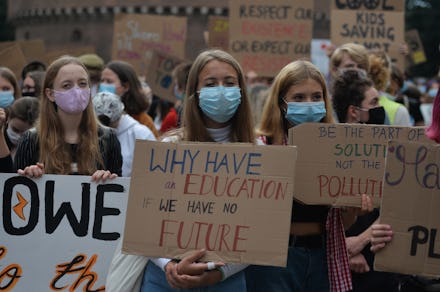A quarter of Americans cite climate change as a reason they don't want kids

About a quarter of childless adults don’t want to have children because of climate change concerns, according to a new study published by data intelligence company Morning Consult. At least 11 percent of surveyed adults considered climate change a "major reason" they didn't want children, while 15 percent considered it a "minor reason."
The numbers come from a survey of adults that looked at how the pandemic has impacted the financial behavior and decisions of millennials.
Although climate change ranked fairly low on the list of reasons not to have children — most childless adults mentioned financial and career reasons above climate concerns — the numbers indicate climate change is increasingly pushing to the forefront of people's minds.
These results come two years after another Morning Consult survey, conducted for The New York Times, that sought to narrow down reasons why Americans were having fewer children. In that study, 33 percent of adults aged 20 to 45 cited climate change as a concern during family planning. In the latest survey, that percentage increased to 37 percent of Gen Z adults and 34 percent of millennials.
The numbers don't vary much between men and women. However, Black, Hispanic, and other ethnicities were more likely to worry about climate change when thinking about their future. A whopping 41 percent of childless Hispanic adults considered it a major or minor reason behind going childless.
Couples who have gone childless for moral and environmental reasons isn't a new thing. The number of people anxious about their potential children's futures and the carbon impact of childrearing has slowly increased in the U.S.
Whether those worries are rooted in science is up for debate.
Some experts believe policy changes and getting rid of society's dependence on fossil fuels will be far more effective than foregoing children. A comment to the BBC from professor emeritus and author Betsy Hartmann even suggested this sort of decision making puts pressure on women rather than the companies that created our climate problems in the first place.
"Instead of focusing on women's reproduction, the urgent challenge of climate change requires tackling the real culprits such as fossil fuel companies and the powerful political and military interests who support them," Hartmann said.
Researchers with Founder's Pledge, an organization that pushes entrepreneurs to donate a percentage of their proceeds to charity, have also conducted a study that found policymaking as the best bet against mitigating global carbon emissions. These policies include environmental regulations, using clean energy, and encouraging the use of electric cars.
Without such policies in place, having a child can create a massive amount of carbon emissions (seen in green in the below graph). But with better policies (seen in navy blue), that impact is significantly minimized.
These studies have shown that worries over the impact of the climate crisis is a legit and increasingly noticeable concern, especially when it can put prospective parents in a situation where they fear they might not be able to offer the best life for their child. But putting the pressure on couples to go childless might be misplaced; instead of telling families to stop having kids, it may be more helpful to demand better environmental policies from global leaders and corporations.
Whether we have kids or not, if these powerful players don't change their ways, we'll all be screwed.